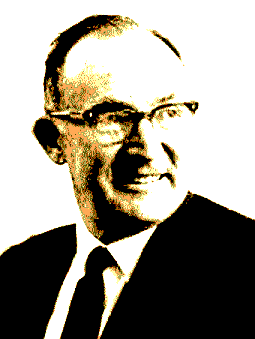| Kelly interest: |

|
|
| Clinical psychologist | ||
| Educator | ||
| Interested in geometry and used Euclid's Elements | ||
| Management studies | ||
| Artificial intelligence | ||
Developed by
Psychological understanding of understanding
(Bannister, Fransella, 1971, 12)
| Kelly interest: |

|
|
| Clinical psychologist | ||
| Educator | ||
| Interested in geometry and used Euclid's Elements | ||
| Management studies | ||
| Artificial intelligence | ||
| A fundamental postulate: | |
| Anticipation of future events channels psychological processes into constructions or templates for predictive purposes (negotiating our way through life) | |
| Eleven corollaries: | ||
| Construction corollary: | ||
| Constencies in experience are collected into a construct for the purposes of prediction | ||
| Individuality corollary: | ||
| People construct differently from different exerience and subjective assessments | ||
| Organisation corollary: | ||
| Hierarchical organising of elements allows less incompatibility | ||
| Dichotomy corollary: | ||
| We know what we know from what elements are not, thus templates are binary and structuralist in shape | ||
| Choice corallary: | ||
| Extending one's constructions to absorb more experience | ||
| Defining again for more clarity and precision for predictive purposes | ||
| Constructive alternativism available | ||
| Range corollary: | ||
| Each construction only works over a limited bounary of experience and prediction | ||
| Some constructions to link to others | ||
| Experience corollary: | ||
| Experience reconstrued, especially with failures to predict well | ||
| Novel events need construct adjustments | ||
| Modulation corollary: | ||
| We only tend to admit experience that generally supports the existing construct | ||
| Some modulations are more open or more closed | ||
| An authoritarian adds in a limited range of authoritarian experience that keeps the construct closed | ||
| A liberal listens to evidence that varies but allows the construct to stay open | ||
| Fragmentation corollary | ||
| Incompatible elements are allowed thus leading to inconsistent behaviour | ||
| Commonality corollary: | ||
| Similar experiences among people lead to similar constructs | ||
| Sociality corollary: | ||
| We can construe others' constructions thus predicting their behaviour and communicating with them | ||
| Note that corollaries are about constructs which are made up of elements |
| Constructs are personal, otherwise called templates |
| Looking at these corollaries: | ||
| Future anticipation is the key (Kelly, 1955, p.46) | ||
| As such we are all personal scientists construing replications (p.50) | ||
| This is to realise objectives (p.49) | ||
| Replications are as grooves in records: pressed and payed | ||
| The grooves generate templates or personal constructs | ||
| Units of interpretation or templates for looking at the world | ||
| We fit templates over the realities | ||
| Though there is a real world out there: | ||
| Constructs are individual | ||
| Constructs are personal | ||
| They facilitate understanding and prediction of the mass of events | ||
| In other words Personal Constructs are as our own personal hypotheses | ||
| Hypotheses are either demonstrated to be true or are contradicted | ||
| Personal constructs are then revised | ||
| Note that constructs are verbal, but they can be non-verbal |
| The clinical approach uses constructive alternativism: | |
| Individuals can change their difficult world view to a better one through which to understand and pursue life events | |
This theory of generating constructs is clearly about how the mind works and opposes behaviourism. It also opposes the constraining effects of any internal drives. It relates to having world views, and links our developing view of the world to experience. It is individualist and optimistic and ape science. In being constructivist, it looks postmodern, but it is more about a window to experience in the real world, and is thus not postmodern. The optimism is based on the freedom to challenge experience through new experience: for example, a good school environment based on discipline that values the person improves the world view of a child that comes from a depressed, poor, inconsistent, family-stressed background. It also allows for later clinical intervention to reconstruct the problematic world view of the adult.
Note that this is an in-out system, that predictive outcomes (true or false) are themselves experience to adjust the system.
Questions arise to challenging experience (by critical thought and reflection, not just by other experience), and the place of the imagination over and above experience. Also we may have personal constructs but find no way of expressing them in action; or ideology is an effective counter to material experience. The theory seems weak regarding non-verbal constructions: it is strongly linked to symbolic interpretation and language, but arguably it does not allow for the dominance of social language constructions of shared meaning in shaping individual constructs (its Social corollary is one of many and limited in scope).
Adrian Worsfold
The Pluralist website was analysed on the basis of Personal Construct Psychology.
Amateur photography can be understood in part in terms of personal constructs.
Bannister, D. and Fransella, F. (1971), Inquirying Man: the Theory of Personal Constructs, Harmondsworth: Penguin Books.
Kelly, G. (1955), Principles of Personal Construct Psychology, New York: Norton.
Kelly, G. (1955), The Psychology of Personal Constructs, New York: Wiley; republished in 1991 in a new format by Routledge, London)
Kelly, G. (1991), The Psychology of Personal Constructs, Routledge, London, new format